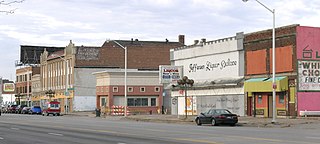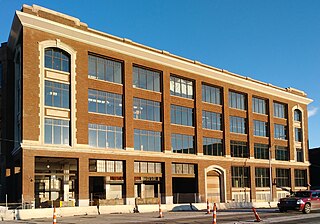
The Stuber–Stone Building is located at 4221–4229 Cass Avenue in Detroit, Michigan. It was listed on the National Register of Historic Places in 1996. It is now known as the Stuberstone Lofts.

The Crescent Brass and Pin Company Building is located at 5766 Trumbull Street in Detroit, Michigan. It was listed on the National Register of Historic Places in 2003. It is currently known as the Research Lofts on Trumbull.

The Graybar Electric Company Building is located at 55 West Canfield Street in Midtown Detroit, Michigan. This warehouse building was rented to the Graybar Electric Company from 1926 into the 1940s. It was listed on the National Register of Historic Places in 1997.

The Sugar Hill Historic District is a historic district in Detroit, Michigan. It contains 14 structures located along three streets: East Forest, Garfield, and East Canfield, between Woodward Avenue on the west and John R. on the east. The district was listed on the National Register of Historic Places in 2003.

The Detroit–Columbia Central Office Building is a building located at 52 Selden Street in Midtown Detroit, Michigan. It is also known as the Michigan Bell Telephone Exchange. The building was listed on the National Register of Historic Places in 1997.

The Chatsworth Apartments is an apartment building located in Midtown Detroit, Michigan, within the campus of Wayne State University. It was listed on the National Register of Historic Places in 1986.

The Cass Park Historic District is a historic district in Midtown Detroit, Michigan, consisting of 25 buildings along the streets of Temple, Ledyard, and 2nd, surrounding Cass Park. It was listed on the National Register of Historic Places in 2005 and designated a city of Detroit historic district in 2016.

The Jerome H. Remick and Company Building is an early 20th-century office building located at 1250 Library Street in Downtown Detroit, Michigan. It later became an annex of the J. L. Hudson Company, and was listed on the National Register of Historic Places in 1996.

The Engine House No. 11 is a fire station located at 2737 Gratiot Avenue in Detroit, Michigan. It is the oldest remaining firehouse in the city of Detroit; it was designated a Michigan State Historic Site in 1975 and listed on the National Register of Historic Places in 1978.

The Frederick Stearns Building is a manufacturing plant located at 6533 East Jefferson Avenue in Detroit, Michigan. The building was listed on the National Register of Historic Places in 1980 and designated a Michigan State Historic Site in 1981. It has been converted to condominiums.

The Jefferson–Chalmers Historic Business District is a neighborhood located on East Jefferson Avenue between Eastlawn Street and Alter Road in Detroit, Michigan. The district is the only continuously intact commercial district remaining along East Jefferson Avenue, and was listed on the National Register of Historic Places in 2004.

The Michigan Bell and Western Electric Warehouse is a former commercial warehouse building located at 882 Oakman Boulevard in Detroit, Michigan. It was listed on the National Register of Historic Places in 2009. It is now known as the NSO Bell Building.

The former Eighth Precinct Police Station is a building located at 4150 Grand River Avenue in the Woodbridge Historic District of Detroit, Michigan, United States. It is the second-oldest police building in Detroit, and was designated a Michigan State Historic Site in 1973 and listed on the National Register of Historic Places in 1974. The building now houses the Detroit Castle Lofts.

The Tushiyah United Hebrew School, later known as the Scott Memorial Methodist Episcopal Church, is an educational building located at 609 East Kirby Street in Detroit, Michigan. This building, an important work of architect Isadore M. Lewis, was constructed as the Tushiyah United Hebrew School and served as the headquarters of the United Hebrew Schools of Detroit. It later served as the Scott Memorial Methodist Episcopal Church, the first mainline African-American Methodist Episcopal church in Detroit. It was listed on the National Register of Historic Places in 2011.

The New Center Commercial Historic District is a commercial historic district located on Woodward Avenue between Baltimore Street and Grand Boulevard in Detroit, Michigan. It was listed on the National Register of Historic Places in 2016.

Starkweather School is an educational building located at 550 North Holbrook Street in Plymouth, Michigan. It was listed on the National Register of Historic Places in 2016. It is the only school from its time still extant in Plymouth, and the only school in Plymouth designed by Malcomson and Higginbotham, who designed numerous schools for the Detroit school district.

The Assembly, previously known as the Edson, Moore and Company Building, is a former warehouse building, constructed for Edson, Moore & Company in 1913. It is located at 1700 West Fort Street in Detroit, Michigan, and has been redeveloped into a mixed use space. The building was listed on the National Register of Historic Places in 2017.

The Lofts Apartments, formerly known as the Medical Arts Building or the Becker Building, is an apartment building located at 26 Sheldon Boulevard SE in Grand Rapids, Michigan. The building was constructed as an office building in 1926, and was listed on the National Register of Historic Places in 2000.

The Warren Motor Car Company Building, also known as Lincoln Motor Car Company Building, is a factory located at 1331 Holden Street in Detroit, Michigan, now part of the Lincoln Street Art Park. It was listed on the National Register of Historic Places in 2020.

The United States Postal Service Roosevelt Park Station is a former United States Post Office located at 1800 18th Street in Detroit, Michigan. It was listed on the National Register of Historic Places in 2020.






















